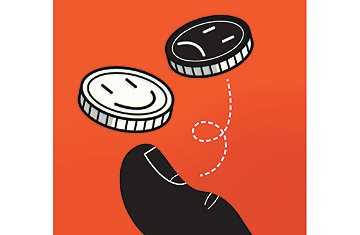
Why you're not in the mood. In emotional economics, how we feel can predict how we deal with the markets
(2 of 2)
All of this supports a core principle of emotional finance, which is that we are all basically id-driven children who love to be told stories, many of which we become wedded to even as we realize that they are on some level false--or at least not quite as true as we think. Eventually, our beliefs take on market lives of their own (housing prices will always rise, Internet stocks can only go up, the E.U. isn't 27 separate economies and cultures but a cohesive bloc), creating groupthink that leads to bubbles. Hedge-fund titan George Soros, a great believer in emotional finance, calls this phenomenon "reflexivity"--not to be confused with reflexology, which a lot of people who've been trading over the past few years probably need.
It's no accident that Soros got rich trading on such emotions against the cold reality of numbers. You can layer the S&P 500 index on top of the Bloomberg Consumer Comfort index since 1993 and see a nearly perfect reflection. That said, the dips and heights overshoot fundamental stock valuations. The markets respond to our moods, but neither is necessarily logical. Hence tulip mania, housing mania and Newt-o-mania.
So what does our mood today tell us about the future? That the me, here, now attitude is making the world a more fragmented place. National energy strategies are becoming more self-interested, countries are hoarding resources (India tried to ban cotton exports recently), and globalization is to a certain extent reversing as multinational firms weigh the risks of shipping goods to and from the world's hot spots and move jobs and facilities closer to end markets. Finance, once the grease of the global economy's engine, is retrenching as many large banks sell off assets and focus more on local markets. It's a world in which getting rich and thinking big may be harder. But as winter blurs into spring, the memory lingers, which is why most of us prefer to stay snuggled under the duvet watching reruns of Downton Abbey.
